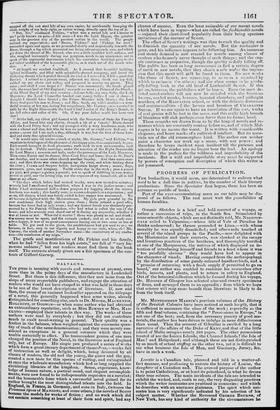MALTAGNA.
THE press is teeming with novels and romances at present, even more than in the palmy days of the manufactory in Leadenhall Street. But there is this difference, that they now issue from the shops of many respectable publishers, and engage the attention of readers who would not have stooped to what was held in those days to be one of the lowest descriptions of literature. If, now and then, the name of an eminent bookseller appeared on the titlepage of a novel, this generally happened when some writer, already distinguished for something else, such as Dr. MOORE, MACKENZIE, HOLCROFT, or Gm:twist—or when some author who had obtained an extraordinary reputation, such as Miss BURNEY or Mrs. Ran- CLIFFE—employed their talents in this way. The works of these authors were read by everybody ; but they did not contribute much to exalt novel-writing in general. Their quality was a feather in the balance, when weighed against the enormous quan- tity of trash of the same denomination ; and they were merely con- sidered as exceptions in a general estimate which they were unable materially to affect. The transcendent genius of one man changed the position of the Novel, in the literature not of England on17, but of Europe. His single pen produced a series of' wcrks Which form a great literary department of themOves,—works full of instruction as well as delight, which, being devoured by all classes of readers,-the old and the young, the grave and the gay, created a new taste for this species of writing, and extinguished at once the wholesale manufactory which had so long supplied the circulating libraries of the kingdom. Sense, experience, know- ledge of human nature, a poetical mind, and elegant accomplish- ments, were now found to be indispensable requisites in a novelist; and the honourable fame which a successful novel gained for its author brought the most distinguished talents into the field. In England, in France, in Germany, and even in Italy, (witness the Promessi.Sposi of MA NZONI, and some others,) the novels of Scorr became the models for works of fiction ; and no work which did not contain something at least of their form and spirit, had any chance of success. Even the least estimable of our recent novel's which have been in vogue—what are called the fashionable novels —enjoyed their short-lived popularity from their being spurious imitations of the manner of Scow.
The effect of Scorr's weitings was thus to exalt the quality and to diminish the quantity cf our novels. But the enchanter is gone, and his influence appears to be following him. An immense and steady demand is now created for novels among classes of readers who foimerly never thought or such things; and the sup- ply continues in proportion, though the quality is daily falling off. The public has been so long accustomed to find a certain degree of merit in new novels, that they obtain a sale under the impres- sion that this merit will ELM be found in them. No new works like those of Scow, are appeao ing, to se.ve as a sisudard by which to esiims:e tbe ethos ; and the class seems io be eradu- ally falling bsek to the old level of Leadenball St: eel. If this go on, however, the publishers will be lose. s. Even (be most de- voted novel-readers will not now be satisfied with the ferocious. basons, cowled monks, bravoes, haunted chambers, and midnight murders, of the RADCLIFFE school, or with the delicate distresses and sentimentalities (f the heroes and heroines of' CitAasorrE SMITH. If we are again to have an inugation of this sort, works of real genius will be lost in the mass, and this really high branch of literature will sink perhaps even lower than its former level. These remarks are drawn from us by the heap of novels and ro- mances which are constantly coming before us, and of which Mal- vagna is by no means the worst. It is written with considerable elegance, and bears marks of a cultivated intellect. But its mate- rials are of the old commonplace kind. The author can neither paint a character nor work up a scene, with any power ; and therefore he heaps incident upon incident till the patience and attention of the reader can no longer bear the load. An apology is made in the preface for the wildness and improbability of the incidents. But a wild and improbable story must be supported by powers of conception and description of which this writer is not possessed.


























 Previous page
Previous page